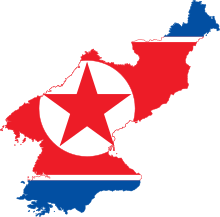 The North Korea Portal The North Korea PortalIntroduction North Korea, officially the Democratic People's Republic of Korea (DPRK), is a country in East Asia. It constitutes the northern half of the Korean Peninsula and borders China and Russia to the north at the Yalu (Amnok) and Tumen rivers, and South Korea to the south at the Korean Demilitarized Zone. The country's western border is formed by the Yellow Sea, while its eastern border is defined by the Sea of Japan. North Korea, like its southern counterpart, claims to be the legitimate government of the entire peninsula and adjacent islands. Pyongyang is the capital and largest city. The Korean Peninsula was first inhabited as early as the Lower Paleolithic period. Its first kingdom was noted in Chinese records in the early 7th century BCE. Following the unification of the Three Kingdoms of Korea into Silla and Balhae in the late 7th century, Korea was ruled by the Goryeo dynasty (918–1392) and the Joseon dynasty (1392–1897). The succeeding Korean Empire (1897–1910) was annexed in 1910 into the Empire of Japan. In 1945, after the Japanese surrender at the end of World War II, Korea was divided into two zones along the 38th parallel, with the north occupied by the Soviet Union and the south occupied by the United States. In 1948, separate governments were formed in Korea: the socialist and Soviet-aligned Democratic People's Republic of Korea in the north, and the capitalist, Western-aligned Republic of Korea in the south. The Korean War began when North Korean forces invaded South Korea in 1950. In 1953, the Korean Armistice Agreement brought about a ceasefire and established a demilitarized zone (DMZ), but no formal peace treaty has ever been signed. Post-war North Korea benefited greatly from economic aid and expertise provided by other Eastern Bloc countries. However, Kim Il Sung, North Korea's first leader, promoted his personal philosophy of Juche as the state ideology. Pyongyang's international isolation sharply accelerated from the 1980s onwards as the Cold War came to an end. The fall of the Soviet Union in 1991 then brought about a sharp decline to the North Korean economy. From 1994 to 1998, North Korea suffered a famine with the population continuing to suffer from malnutrition. In 2024, the DPRK formally abandoned efforts to peacefully reunify Korea. North Korea is a totalitarian dictatorship with a comprehensive cult of personality around the Kim family. Amnesty International considers the country to have the worst human rights record in the world. Officially, North Korea is an "independent socialist state" which holds democratic elections; however, outside observers have described the elections as unfair, uncompetitive, and pre-determined, in a manner similar to elections in the Soviet Union. The Workers' Party of Korea is the ruling party of North Korea. According to Article 3 of the constitution, Kimilsungism–Kimjongilism is the official ideology of North Korea. The means of production are owned by the state through state-run enterprises and collectivized farms. Most services—such as healthcare, education, housing, and food production—are subsidized or state-funded. North Korea follows Songun, a " military first" policy which prioritizes the Korean People's Army in state affairs and the allocation of resources. It possesses nuclear weapons. Its active-duty army of 1.28 million soldiers is the fourth-largest in the world. In addition to being a member of the United Nations since 1991, North Korea is also a member of the Non-Aligned Movement, G77, and the ASEAN Regional Forum. ( Full article...) Selected article -The Chaplain–Medic massacre took place in the Korean War on July 16, 1950, on a mountain above the village of Tuman (current Duman-ri, Geumnam-myeon, Sejong City). Contrast to U.S. Army's official history, South Korean local natives claimed that it took place on a mountain above the village of Yongdam-ri, which is next to Duman-ri. Thirty unarmed, critically wounded United States Army (US) soldiers and an unarmed chaplain were murdered by members of the Korean People's Army (KPA) during the Battle of the Kum River. Operating at the Kum River, troops of the US 19th Infantry Regiment, 24th Infantry Division, were cut off from resupply by a roadblock established by KPA troops of the 3rd Division. The roadblock proved difficult to break, and forced US troops to move through nearby mountains to evacuate their wounded. Thirty critically wounded US troops were stranded at the top of a mountain. Attended to by only two non-combatants, a chaplain and a medic, the wounded were discovered by a KPA patrol. Though the medic was able to escape, the KPA executed the unarmed chaplain as he prayed over the wounded, then killed the rest of them. The massacre was one of several incidents that led US commanders to establish a commission in July to look into war crimes during the war. The same month, the KPA commanders, concerned about the way their soldiers were treating prisoners of war, laid out stricter guidelines for handling enemy captives. Other than this change, the historiography of the incident in North Korean sources is largely unknown; as a result, sources detailing the incident are almost exclusively from the United States and other United Nations allies. ( Full article...)CategoriesRelated portalsCommunist countries in Asia Other countries North Korea in the news
Selected image -
Korean People's Army copies of Russian
BTR-80s on parade
Did you know (auto-generated)
More did you know
General images -The following are images from various North Korea-related articles on Wikipedia.
North Korea topicsThings you can do
Associated WikimediaThe following Wikimedia Foundation sister projects provide more on this subject:
Web resources
Notes Discover Wikipedia using
portals |













































